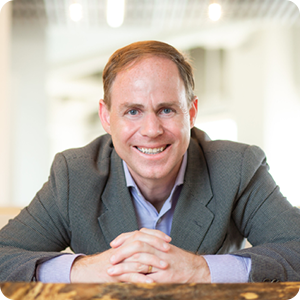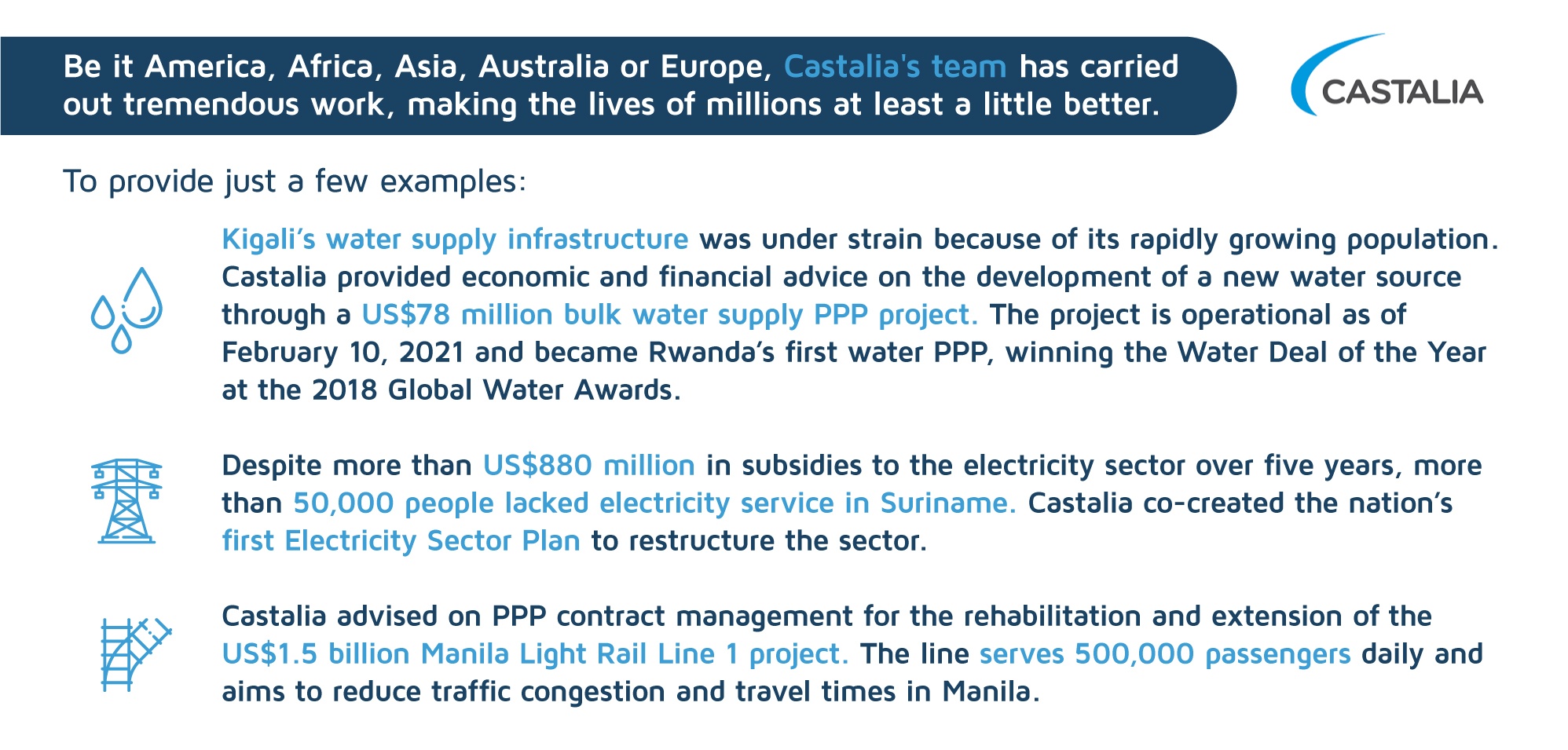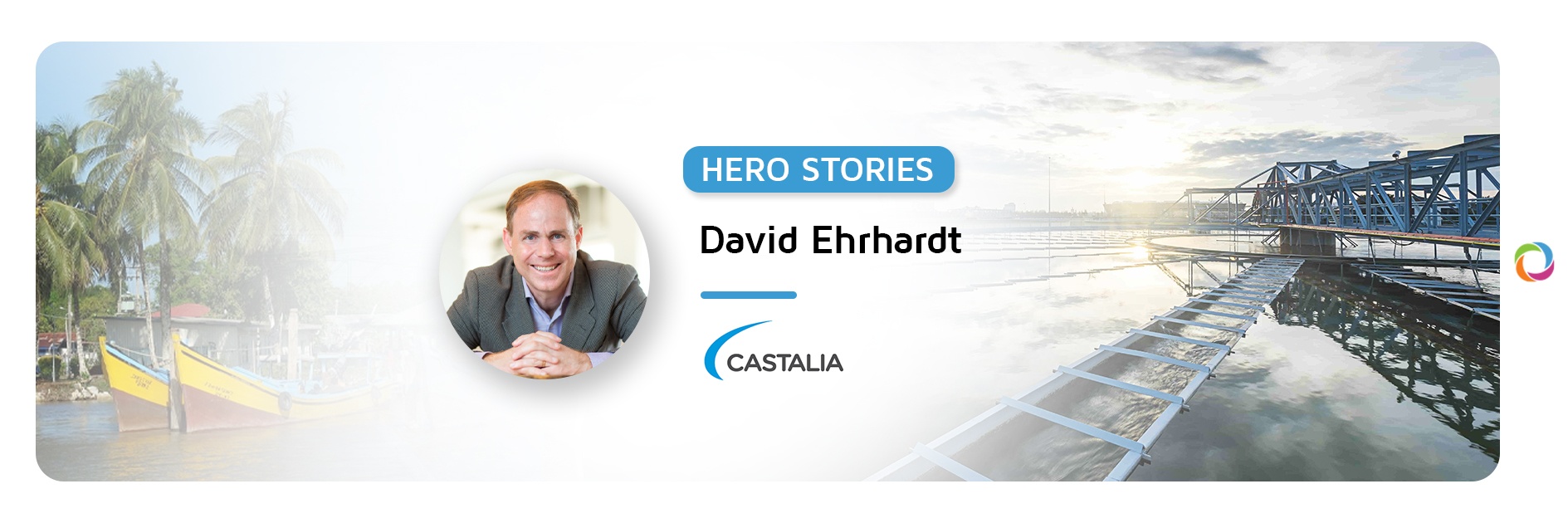By Natalia Turcan
Hero Stories is a new DevelopmentAid project intending to shed light on the stories of those people who make change happen step by step, day by day. It is about people whose dreams and goals go hand in hand and whose achievements and success are inspirational. It can be you, him or her. It can be anyone whose determination to make the world a better place is unfailing. We at DevelopmentAid are here to discover those people and reveal their hero story.
 Our hero today, David Ehrhardt, has earned the reputation of being a reliable international infrastructure expert. With over 25 years of experience, he has proved his commitment to bringing a positive change to the world by contributing to dozens of global projects related to water, transport, telecommunications, and electricity. His appointment to the position of Chief Executive at Castalia, a company focused on finding solutions to infrastructure problems, merely serves to reveal his eagerness to continue in this sector. Since 2002, David, together with his team at Castalia, has contributed to building better lives in Latin America, Africa, Asia and Australia, and New Zealand as well as in Europe.
Our hero today, David Ehrhardt, has earned the reputation of being a reliable international infrastructure expert. With over 25 years of experience, he has proved his commitment to bringing a positive change to the world by contributing to dozens of global projects related to water, transport, telecommunications, and electricity. His appointment to the position of Chief Executive at Castalia, a company focused on finding solutions to infrastructure problems, merely serves to reveal his eagerness to continue in this sector. Since 2002, David, together with his team at Castalia, has contributed to building better lives in Latin America, Africa, Asia and Australia, and New Zealand as well as in Europe.
The following interview will make it clear what the driving force between his own and his team’s success is.
We met on a pleasant sunny terrace in Jamaica at 8 am where all around us seemed to be enjoying their breakfasts in agreeable company and I myself was happy to discover that David was an interesting interlocutor, passionate about his job and his team, and fond of the challenges that enable himself and his company to enjoy continuous progress.
The range of projects implemented thanks to Castalia’s contributions is so wide that listing every single one would be impossible. So, I asked David to mention three projects of which he was the most proud.
“Oh, there are so many and they are all dear to me! I’ll tell you about a recent one, about the Port of Auckland in New Zealand, which is such a beautiful place in a clean city, so they wanted to make sure that the port remained clean too. They decided not to use any diesel vehicles at the port and switch to electric vehicles, specifically, hydrogen-electric vehicles. Then we suggested that such an important change would be expensive but if the scale was increased, it would be better valued.
Another program I’m very proud of is a couple of related projects in Africa and Asia. We started in Nigeria with a project that involved improving electrification. The goal was to create opportunities for private entrepreneurs to create small electricity utilities, most of which would be powered by solar panels or another source of energy in order to do this in a friendly, sustainable way.
Helping Cape Town when they were facing the day zero water crisis is another project, I am very proud of as well. We were asked to help not with the immediate crisis, but with planning to make sure that this would never happen again which involved resilience planning for the water system in Cape Town. And we were there, as the city was running out of water, it was a very stressful time, but it also made it real, what we were dealing with. ”
As advisors, the Castalia team lays the foundation for projects and hence I assumed that David was best placed to confirm how long it takes for a project to evolve from an idea into results. My assumption was correct.
“It takes a lot of time. Because our work is advisory, we offer advice about the strategy, and it may take a year or more to undertake the analysis and discuss the problems, and then inform governments what they should do. But they do not necessarily do what we say, so we try to present our strategy in the form of a decision document, for the government to understand how to implement the idea. And then it may take more than two or three years to actually see something happening. Younger people who come to work at Castalia can easily think and feel that, after two years, nothing has happened but over four to six years, we do see the changes and we have the chance to be involved and remain there to make those changes happen. As an example, we developed the public-private partnership policy in Jamaica, and have been working on this for many years. The country has implemented many of these projects. It takes time, but it’s worth it.”
Castalia is generally viewed as a successful company and although success can have so many definitions, David describes it in rather pragmatic and clear-cut terms.
“In relation to our projects, to be successful the client has to be satisfied. It also needs to be profitable. It should have a positive result for the world. So, we try to make enough money to stay in business but simultaneously we try to make the world a better place. And this is good for the team, as well.”
For many, success comes following a raft of failures and lessons learned. However, this does not seem to be the case for Castalia as David could scarcely recall a failed project.
“Failing to complete a project? Hmm, I can’t recall such a situation at the moment. We are very tenacious so, when we run into a problem, we always try to find solutions. I think when we do encounter difficulties it’s when we are not on the same page as our client. And it takes a lot of negotiation and it’s extremely stressful until we come to see things in the same light. But, as I said, it’s worth it.
Yet, in a way, this has happened to us too. I was working as an expert in very difficult arbitration with the government of Tanzania about power plants where there was an ongoing dispute between the government and the owners of the power plants. There was just one more step to go, some financial calculations and then we were told to stop as they had just hired a new team. I think that the government’s interests had changed so that we no longer continued with this project.”
Obviously, his position involves a lot of travel to make sure that each project is running smoothly but, for David, travel also means getting acquainted with new cultures and meeting new people which he very much likes to do.
“Before the pandemic I guess I used to travel about one-third of the time, and I love it, I don’t think I would do this job if I didn’t like going to new places and learning about new cultures or meeting new people. But we also try to concentrate a little bit in certain areas, such as South Africa, Mozambique the Caribbean, and South East Asia. It’s good to keep doing work in those countries so it’s also nice to maintain relationships and deepen our knowledge about these cultures.”
Over the past five years, David worked a great deal in the Caribbean and Africa so I was curious to know how he manages to work efficiently while traveling around the world.
“Obviously, it’s not all me. We have a great team of about 50 staff and trusted associates. I am based in Washington DC and we have offices in Paris, in Sydney in Australia, and one in New Zealand. The teams there look after the projects in their geography, and they may consult with me regarding any strategic issues.”
Naturally, traveling involves interaction with new places and new people so I was curious to learn about his transformation experiences as a result of communication with these new elements.
“Firstly, I have to say that growing up in New Zealand with British parents, my cultural setting was fairly quiet and reserved. When you grow up somewhere you think that everywhere else is like that, or that other people are wrong if they are not like that. You have to travel a lot to understand that there are many different ways of being. Getting to know the American culture better, Americans are much more outgoing and louder than New Zealanders, so I look to get a better balance, I would say, and communicate more, and be able to speak about our achievements. I have spent a lot of time in Jamaica, and Jamaicans are so tremendously warm and outgoing, and kind. What I learned from coming here is being better able to connect to people and enjoy myself.”
As we touched upon time and its unpredictability, I had to ask how the COVID-19 pandemic has affected Castalia and its projects.
“It’s not as bad as we thought, but there were some areas where our projects dried up. Speaking about developing countries, their demand for our services remained the same or even increased.
Over a period of time, we had got used to going to see our clients. During the pandemic, we had to achieve this through video conferences. But we were ready to work remotely, our IT system was already well set up and anyone in Castalia can be completely self-sufficient and connect with colleagues wherever they are in the world. With all these things together, we were able to keep going. Some things were good, I could travel less, I found many of us were equally or even more productive working from home. But we missed seeing each other and many people, I think, felt stressed and isolated, and although we tried to stay social, it is not the same. At the end of the COVID-19 pandemic, we don’t want to have things just exactly the way they were before, we want the best from both worlds.”
Meeting such an interesting person with such vast experience, it would be a pity not to seek some advice for those who may gain inspiration from our today’s hero, David Ehrhardt.
“I guess that the key is to have critical thinking, communication rather than just living in the conventional wisdom, asking questions and expressing your own ideas clearly and with intellectual honesty. If people did that, we would achieve more progress.”


